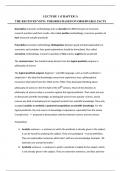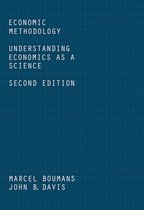LECTURE 1 (CHAPTER 1)
THE RECEIVED VIEW: THEORIES BASED ON OBSERVABLE FACTS
Descriptive economic methodology aims to describe the different types of economic
research practices and their results. Also called positive methodology. (concerns question of
how science is actually practiced)
Prescriptive economic methodology distinguishes between good and bad explanations in
economics and considers how good explanations should be formulated. Also called
normative methodology. (concerns question of how science ought to be practiced)
The received view ( the standard view) derives from the logical positivist program in
philosophy of science
The logical positivist program (logicism = scientific language, such as math; positivism =
empiricism = the idea that knowledge comes from experience) was a philosophical
movement that lasted from the 1920s to the 1950s. They dominated thinking about
philosophy of science in the first half of the 20th century. Much of the direction in
philosophy of science today is a reaction against the logical positivists. Their main aim was
to demarcate scientific knowledge, to distinguish science from pseudo- science, and to
remove any kind of metaphysical or imagined content from scientific knowledge. They only
accepted analytic or synthetic a posteriori propositions as scientific knowledge. For the
logical positivists, the only source of knowledge is experience, especially from the senses
(=empiricism). => proposed a demarcation criterion between science and not science
Propositions
1. Analytic sentence = a sentence in which the predicate is already given in the subject.
It can be found by analysing the subject. They are tautological – true by definition.
They are explanation sentences which don’t add any new knowledge. Example: “All
bachelors are unmarried males.”
2. Synthetic sentence = a sentence in which a predicate is added to the subject, which
is not already given in the subject. They are extension sentences, and thus add new
, knowledge. These sentences derive from experience/sense perception.
Example: “This person has brown hair.”
o A priori sentence = a sentence that is built before and independently
of experience. These sentences are universal and important for
science. (They don’t depend on experience, since experience only says
that something is the case, not that something is universally true)
Example: “All balls are round.”
o A posteriori sentence = a sentence that is built after and because of
experience. A synthetic statement is synthetic a posteriori if it is
shown to be true by empirical research.
Example: “This ball is blue.”
In the 18th century, Immanuel Kant introduced a third important category for science: the
synthetic a priori sentences. These statements are universally true and add new knowledge,
but they are neither shown by empirical research, nor true by definition (meaning the
predicate is not given in the subject).
Example: “Everything happens for a reason.”: “Reason” is not given in the word
“everything”, so it’s a synthetic sentence. However, the sentence is universally true and thus
it cannot come from experience.
“A straight line is the shortest way between two points.”: The words “straight line” don’t
contain size, however, the sentence is universally true.
However, at the end of the 19th century/beginning of 20th century, major scientific
breakthroughs (p.10) were not in line with Kant’s third category of propositions and led to
the logical positivists denying the existence of synthetic a priori propositions in science,
and asserting that all propositions that are not true by definition should be subjected to
investigation by empirical research.
The verifiability principle states that a synthetic/non-analytic statement is meaningful if it
can be judged to be true or false by sense perception, or in other words, when it is
,empirically verifiable. Because of this principle, many statements in ethics or religion must
be considered meaningless in science.
Syntactics deals with the formal relations between signs or expressions in abstraction from
their signification and interpretation.
Semantics deals with the signification and interpretation of the signs or expressions.
Summary of the aims of logical positivists:
1. To formulate precisely central philosophical notions such as a criterion of
meaningfulness (the verifiability principle) and the distinction between analytic
claims (that are true by definition) and synthetic claims (that must be testable)
2. To develop precise definitions of central scientific notions such as theory,
explanation, confirmation, etc.
The logical positivists made a distinction between the context of discovery and the context
of justification:
Context of discovery = the way in which a theory is discovered (which could be for a
variety of accidental reasons)
Context of justification = a rational reconstruction of the theory according to the
tenets of logical positivism (on the part of the discoverer and/or anyone else
developing the theory) for the purpose of its justification.
The logical positivists argued that philosophy of science should really only concern itself
with the context of justification. For them, the context of discovery was irrelevant to
establishing the scientific value of a theory. For the logical positivists, biographical and
historical data about the lives of great scientists should have no place in any serious history
of the subject.
Another fundamental distinction drawn by the logical positivists was between theories and
the evidence, facts, and data, since theories depend upon the latter for their justification:
Scientific theories = systematic collections of concepts, principles, and explanations that
organize our empirical knowledge of the world.
, In the advance of scientific knowledge, theory and evidence are given different weights and
they play different roles: the main problem for philosophy of science, and also for economic
methodology based on logical positivist thinking, is to explain the relation between them.
Syntactic view = the logical positivist understanding of theory
Axiomatization (in first-order formal language) = the proper characterization of a scientific
theory according to the syntactic view.
Philosophy of science
Ontology (what the world is)
o The study of world views Is there a God?
Ontological individualism no such a thing as society, just individuals and
their families understand individuals and they form the society in
aggregate
Ontological structuralism Marxism (if born capitalist you will be happy =>
know structure of society and therefrom understand the life of an individual)
o philosophical discussion about the nature of reality→influences your world
view and thus the product of your science→in mainstream economics: the
individual is the essence of society (rather than vice versa).
Epistemology (what can we know) philosophical study of the nature of knowledge
where to start your research
o individuals actions accumulate to laws
Difference between ontology and epistemology: build up by studying laws, but individuals
give the rise to laws (epistemology) while ontology looks at beginning of science, the world
begins with God
Method
o Statistics courses
Sociology of science






